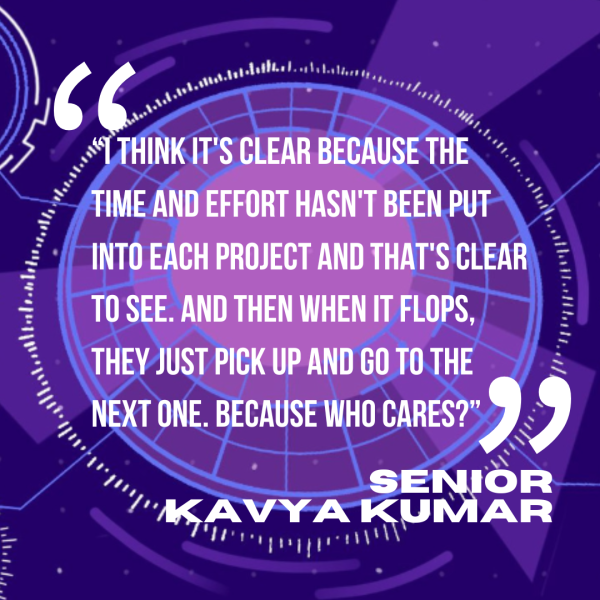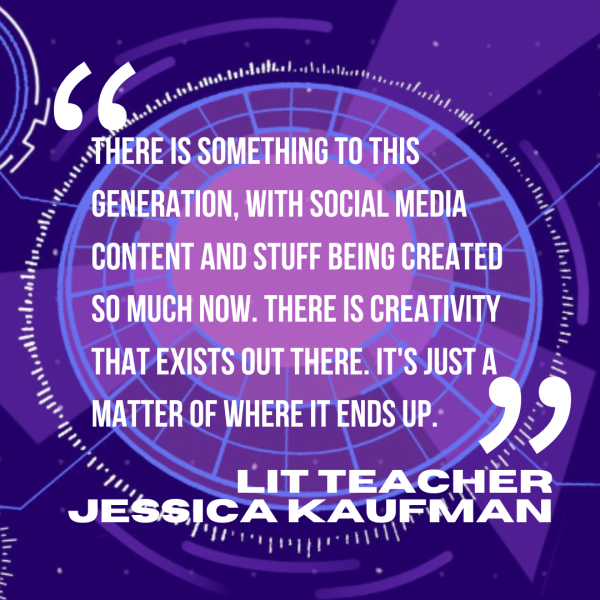Literature teacher Jessica Kaufman recalls watching the first “Ghostbusters,” which was released in 1984, with her dad as a kid. A few years ago, Kaufman saw a rebooted version of her childhood movie “Ghostbusters,” one of the many adaptations, reboots and remakes that she has recently seen on screen. For the past few years, Kaufman has noticed the rising trend of film sequels and modern recreations of older films, along with books and video games being adapted into movies, and feels like there is less creativity in the movie industry than before.
MVHS alum ‘21 and film student at Chapman University Shivani Verma believes that this recent trend may be due to the state of the economy — inflation increases the budgets for movie making, and Verma says there is less room for mistakes and flops. Kaufman agrees, adding that the increase in competition in the industry makes original work even more risky. Since the outcome of an original work is often uncertain, Verma says remakes and adaptations that have already had huge successes in the past guarantee some profit.
However, Verma notes that sometimes, movies “playing it safe” can feel lazy or boring. Senior Kavya Kumar agrees, using the drama department’s Saturday Night Live (SNL) sketches as an example. She says they have shifted from adapting NBC’s SNL sketches to creating their own original work, which has been extremely successful.
“If it’s something that’s new, then it won’t be compared to other things,” Kumar said. “And that makes it just 100 times better because, even when we come up with SNL sketches each year it’s because we want a sketch that no one has ever seen before. We used to use the NBC SNL sketches but now we make our own stuff so it’s much more authentic.”
Kumar also says students are much more passionate about the sketches that they wrote themselves, explaining that they give their all into directing and casting for those sketches as they care more about them. She observes that many movie companies are choosing to create movies that would accumulate the most profit rather than their passion for them.

“I feel like they’re coming out with movies really quickly, and I think they’re just doing it for money,” Kumar said. “I think it’s clear because the time and effort hasn’t been put into each project and that’s clear to see. And then when it flops, they just pick up and go to the next one. Because who cares?”
Similarly, Verma believes that one of the main reasons people don’t like adaptations is because of the sense that directors don’t respect the source material enough, changing personalities of characters or loosely following plots. However, she acknowledges not all adaptations are like this, citing the recent Percy Jackson series as an exception. Although the directors made changes from the original book, Verma felt it was easier to support the changes because the author, Rick Riordan, was also the executive producer of the TV show adaptation and extremely involved in every aspect of the series.
“No matter how much you don’t like changes, you can’t really argue, almost because that would be arguing against the person who made those decisions in the first place,” Verma said. “And you’re like, ‘Well, if he stands behind it, I guess I do, too.'”
Verma appreciates how Riordan released behind-the-scenes facts about each episode and explained why certain decisions were made. She says they help her understand the reasoning behind the modifications and influence her opinions and thoughts on the changes.

However, regardless of the quality of the adaptation or remake, Kaufman still hopes to see more original works and believes that the younger generations will be able to bring that back to the film industry. She highlights the trends and unique videos that younger people create on social media, emphasizing how creativity still exists in today’s world.
“I’m really hopeful that as your generation gets older and starts entering the workforce, the creative force kind of comes back,” Kaufman said. “Because there is something to this generation, with social media content and stuff being created so much now. There is creativity that exists out there. It’s just a matter of where it ends up.”











